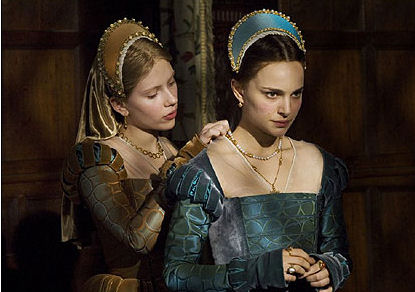Be careful what you wish for...
As a Cambridge University
history
graduate, I have a tendency to be fairly cynical when it comes to any
films
made for popular consumption based on ‘real’
historical events. Hence,
it came as a big surprise that I can
wholeheartedly recommend The Other Boleyn Girl as a vivid,
emotionally-charged
and colourful romp through, arguably, the most turbulent time in the Tudor Court
under
Henry VIII.
The film centres on the lamentable fortunes of the Boleyn sisters,
Anne and Mary, whose futures become irrevocably entwined with King
Henry's through some clever and dastardly plotting by their maternal
uncle, the revile-worthy Duke of Norfolk. What unfurls, slowly and assuredly, is a
rollercoaster of emotion that grips the senses from the get-go.
Having read
the book by Philippa Gregory, it was interesting
to see how well the film was done, but even for a non-history person -
with
very little grasp of the politics and general background to the
situation
regarding Henry’s lack of a male heir - the film is enjoyable. Even those who get dragged
along with a
group of others will certainly not feel that it has been two hours
badly spent,
when you get what is essential to any worthy film; excellent acting and
a
script which lets this shine through. For
any guys whose girlfriends have mentioned this film,
it’s not just a
chic-flick and you will be able to enjoy it too, perhaps even earning
brownie-points for
comparing favourably - I hope so, anyway! - with the featured male
roles…
Of note is
that this film is one of two halves, as clear a
contrast and as inextricably linked as the sisters around which the
story
revolves; of gentle love versus ambition and calculated desire; of
idyllic
countryside versus the intrigue and depravity of court; gaiety versus
gruesomeness; of blonde versus brunette.
Truly, the
film has
excellent casting and the two leading ladies, Natalie Portman (Anne)
and Scarlett
Johansson (Mary), are well-balanced, in both the script and role
allotted to
them - neither concentrating on one at the expense of the other. The culminating effect is
one of balance; the
greater glory Anne sought had a greater cost, compared to the less
glamorous
position Mary endured with a happier ending.
No matter how different their views or feelings, the
sisters remain very
strongly attached to each other, which is what glues the film together
from
start to finish.
Unlike many
films, the strong emotions of jealously, hate,
loyalty and passion required for certain situations are there in
believable and
poignantly human proportions, so that even I, who would say am fairly
inured to
blood and violence, found the final climactic scene hard to watch.
Of interest to
anyone who would go to see films for a
particularly stunning actress or glimpses of bare flesh, this film may
be a
slight letdown, as the usually breathtaking Johansson is somehow made
almost
plain on occasions. Nudity, too, is used sparingly but with great
effect. From the very
first minute you’re drawn to
the detail and costumes that delights the eye; brilliance of dress that
you
just don’t get nowadays (for good reason obviously
– try catching the bus or
the tube wearing those dresses would be hard enough, let alone sitting
down…)
that adds another layer of meaning and symbolism in a film that lacks
the CGI
and stunts that people are often unconsciously expecting of any
cinematic
experience.This film needs
none of
these props; Tudor court life was dramatic and brutal enough, frankly.
As with any
good film, there is a fair smattering of
villains; reliably evil and calculating is the Duke of Norfolk (David
Morrissey) for whom we are all able to feel an acute dislike from the
moment
his shadow darkens the Boleyn door. The
parents of these most troublesome twosome are left somewhere in the
middle
ground - the father (Mark Rylance) ambitious for all the supposedly
right
reasons, but the mother always suspicious of the cost of the apparent
benefits
of having one daughter whoring herself to the king and the other
dangling
herself in front of him.










